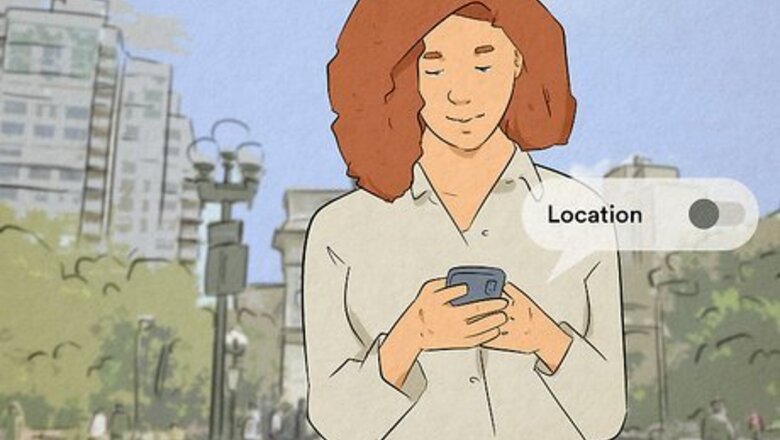
views
Interacting Online
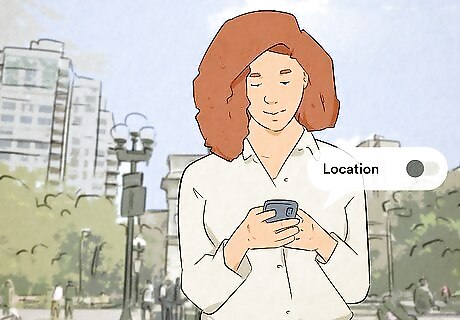
Keep personal information off your profiles. If you want to stay safe online, anonymity is the way to go. Don't even use your real first and last name, or list where you live or go to school. You don't want strangers online to know too much about you. If you have to enter your location, keep it as general as possible. List the general area rather than the city. Never put down your full address. Some sites allow you to organize your friends list into groups. You can then set the privacy controls so that only the people in those groups can see the other members.
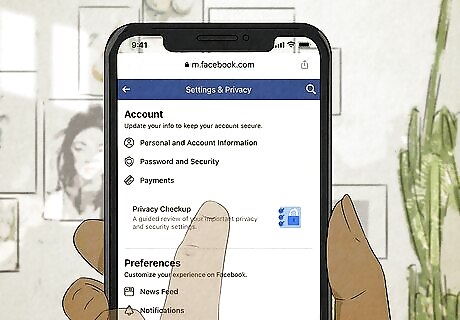
Check your privacy settings. Every social media platform or dating app has privacy settings that are designed to protect you. These settings allow you to control who can see specific information or posts you make. If you don't understand the way the privacy settings work, talk to a friend who can help explain them to you and get things set up the way you want. Most social media platforms allow you to view your profile the way a stranger would, so you can ensure you're not revealing more information than you want.
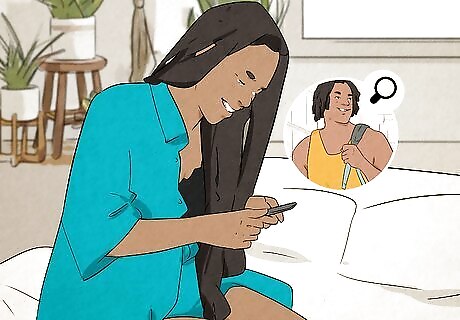
Look into the background of people you meet. Once you've started talking to someone regularly, it may be time to do a little online sleuthing before you meet up in person. Even if you don't have a lot of personal information about them, there are still ways you can determine if they are deceiving you. Look at their friends list. If you have any friends in common, contact them and ask how they know the person and if they've ever met them in real life. Do an image search of them to see if they appear elsewhere on the internet. If someone's trying to pretend to be someone else, they may intend to harm you. Look at how they interact with their friends or followers. You can usually tell by these interactions whether they actually know each other in person.
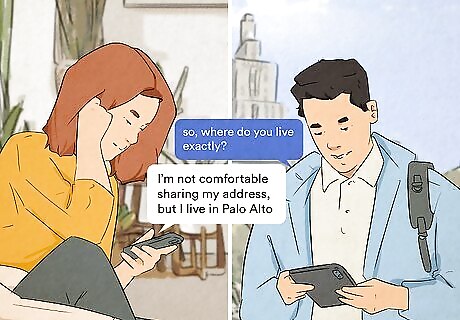
Avoid giving away any personal information. In general, you want to avoid telling anyone too much about yourself until you've met them face-to-face. Get to know them a little better before you tell them your home address, phone number, or any other personally identifying information. This can be a delicate balance. If they're being safe, they won't reveal any personal information either. This can make it difficult to look into their background, but try to respect that they have the same privacy concerns you do.
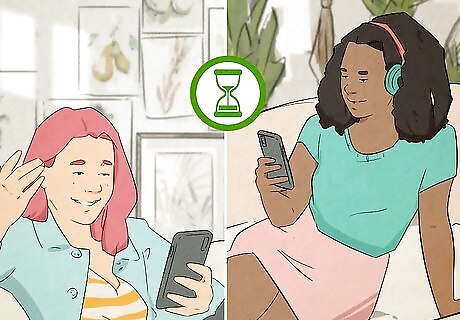
Take it slow. It can be easy to divulge too much information about yourself too quickly when you're talking online – especially if you talk to the person frequently. Keep your emotions in check and check yourself regularly to make sure you're not getting ahead of yourself. You don't want the person to know too much about you until you've met them in person at least two or three times. Keep conversations focused on common outside interests, such as music or movies. Avoid talking too much about your own life or your thoughts and feelings.

Trust your instincts. When you make friends with somebody, it can be tempting to shrug off comments or behaviors that normally would give you pause. Keep in mind that this person is a stranger, and avoid giving them the benefit of the doubt. If the person says something that bothers you, mention it directly. Be honest, and don't allow them to think you're okay with something when you're not. If you don't feel comfortable talking to the person about something that's bothering you, that is a red flag and indicates that this person isn't the best friend for you. EXPERT TIP Safety is really important, so first and foremost, if something instinctively rubs you the wrong way, don't meet that person. Joshua Pompey Joshua Pompey Dating Coach Joshua Pompey is a Relationship Expert with over 10 years of helping people navigate the online dating world. Joshua has run his own relationship consulting business since 2009 at a success rate of over 99%. His work has been featured in CNBC, Good Morning America, Wired, and Refinery29 and he has been referred to as the best online dater in the world. Joshua Pompey Joshua PompeyDating Coach
Meeting in Public

Choose a place where you're comfortable. You may not want to meet too close to home if you're worried about the person knowing where you live. But at the same time, you don't want to meet someone for the first time in an unfamiliar part of town. Often you will feel more comfortable in a place where you've been several times, especially if you're anxious about meeting this person for the first time. Ideally, you still want a place that you don't frequent often. If things don't work out, you don't want to risk running into that person again. Try to meet during the day, if possible. If you're both only available in the evening, choose a place that's fairly busy at the time you're planning to meet.
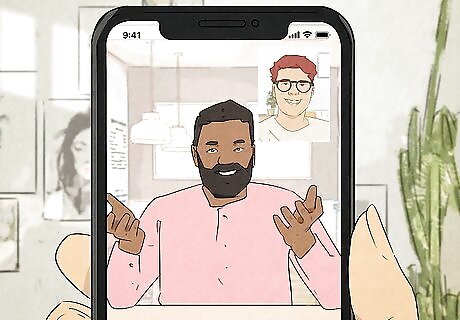
Talk before meeting. Before you meet someone in person who you've met online, you want to make sure they are who they've said they are. The best way to go about this is to have a phone call or live video chat with them. If the person can't video chat with you, ask them to take a selfie holding a sign with particular words on it. This can assure you that they aren't pulling photos off the internet. If you've developed a friendship to the point where you want to meet in person, they shouldn't have any problems doing this. If they refuse or make excuses, it could be a red flag.

Bring a friend. If you're really nervous about meeting the person, bring a friend along with you or organize a group date with several friends. If the person legitimately wants to get to know you, they shouldn't be put out that you want to meet in a group first. Bring someone who knows the area, especially if you're meeting the person further away from home, or in an unfamiliar part of town.

Avoid alcohol on your first meeting. For people of drinking age, it's quite common to meet people at the local bar or pub. The problem is that alcohol can lower your inhibitions and cause you to lose control. If you do decide to drink, order a single drink with a low alcohol content, such as a light beer, and some water. Sip slowly, alternating between the beer and the water.

Ask lots of questions. The point of meeting in person is to get to know each other better. Since the person might be more reserved in person than they were online, be prepared to ask questions to get them to open up. Referring back to a conversation you had online can help make both of you more comfortable. You'll be able to link the person in front of you to the conversations you had before. For example, you might say "I remember you telling me that Radiohead was your favorite band. Did you hear that they're playing a concert here in a few months?" EXPERT TIP Joshua Pompey Joshua Pompey Dating Coach Joshua Pompey is a Relationship Expert with over 10 years of helping people navigate the online dating world. Joshua has run his own relationship consulting business since 2009 at a success rate of over 99%. His work has been featured in CNBC, Good Morning America, Wired, and Refinery29 and he has been referred to as the best online dater in the world. Joshua Pompey Joshua Pompey Dating Coach Try to avoid awkward silences. Have some fun stories ready to fall back on, because that can help keep your nerves from getting the best of you.

Keep your first meeting brief. For your initial meet-up, find some place you can sit and talk for a half hour or so, but don't plan on anything any longer than that. This way, if you find you're not interested in the person, you don't have to spend too much time with them. A short meeting gives the two of you the opportunity to sniff each other out and figure out if there's any connection in person as there is online. Make a commitment with another friend so you have an easy out if the person tries to convince you to come somewhere else with them. If they do try to invite you somewhere else, pay attention to where. A predatory person might try to lure you to a more private or out-of-the-way location.
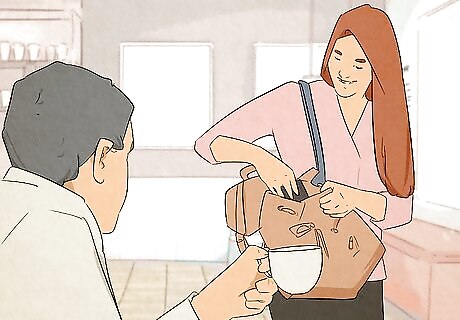
Take personal belongings with you. If you have to excuse yourself at any point, such as to use the restroom, do not leave your purse or cell phone unattended with the person you're meeting. Treat them as a stranger and don't give them access to your private information. Be extra-cautious if you have a drink. Inspect the drink for any tampering upon your return.
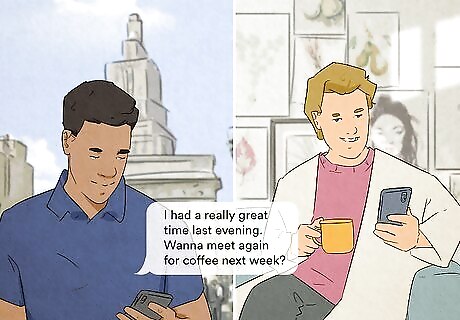
Plan another meeting. If the first meeting went well, plan a second, longer meeting rather than extending the first meeting. This way you're continuing to take things slowly and you're remaining in control of the situation. Keep your second meeting around 20 to 30 minutes; it's okay if it goes a little longer, however. Work your way up to a longer meeting. For example, you can share a meal together or go for a walk.
Handling Sticky Situations

Go with your gut. Even though things are going well and outwardly the person seems fine, you may have a nagging feeling that something isn't right. Don't ignore that feeling. If you feel like you're not safe, get out of there as quickly as possible. If you feel that you need to leave, do it – especially if you feel like your personal safety is in jeopardy. Go to the restroom and call a nearby friend to help you. You also may be able to talk to someone who works at the place where you met. Explain the situation to them and they may be able to help you.

Have an escape route. Before you meet up with the person, have several options in mind that will enable you to get out of the situation quickly if anything bad happens. Rely on your own transportation as much as possible. If you have your own car, drive to the meeting and park as close as you can. Don't go anywhere else where the person could isolate you from your transportation. Have a couple of options if you don't have your own car or are relying on public transportation. For example, a taxi, Uber, or Lyft.
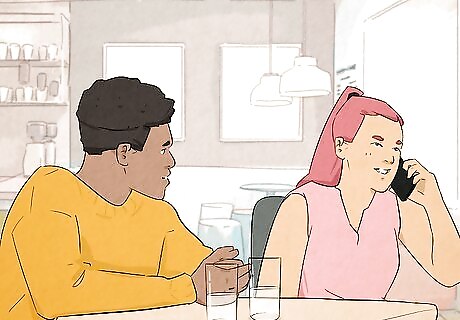
Get a friend to call or text. Always make sure that several people know exactly where you're going and when. Arrange for a friend to check in on you during the meeting so you can let them know if things aren't going well. Keep your phone on your person at all times, either with the ringer on or on vibrate so you won't miss this text or call. You also can get a friend to drop by and act as though the two of you just ran into each other. Only do this if both of you are able to act through the situation.
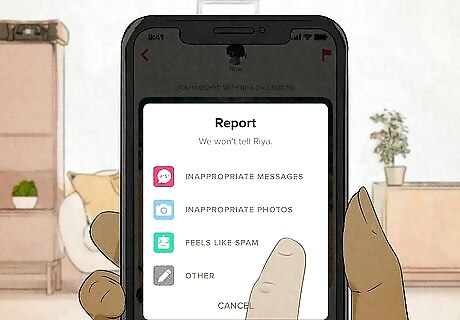
Report threatening or dangerous behavior. If the meeting goes really bad, and the person turns out to be someone dangerous, report them to the local police as well as to the social media platform or dating app where you first connected. If you report their behavior to the website or app, you may be able to get them banned. You also have the option of blocking them so that they cannot contact you again.




















Comments
0 comment